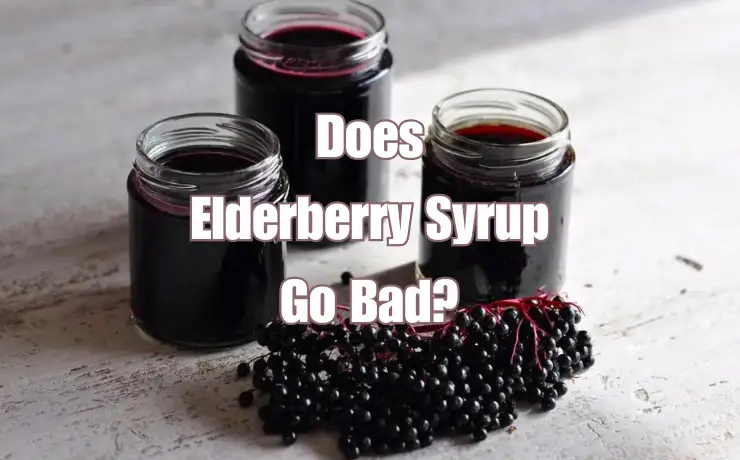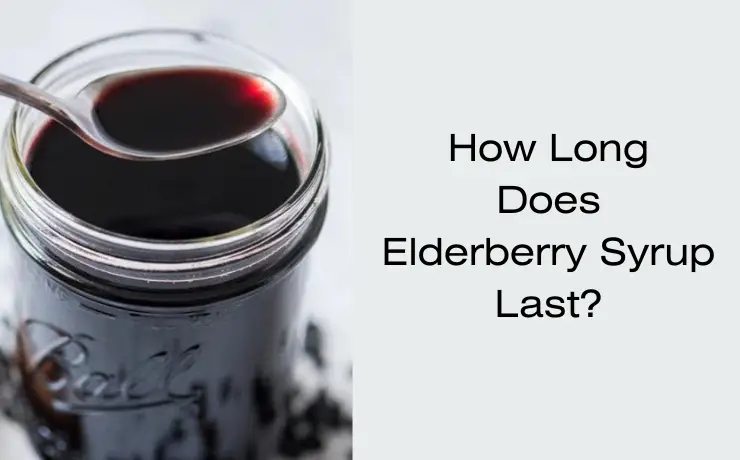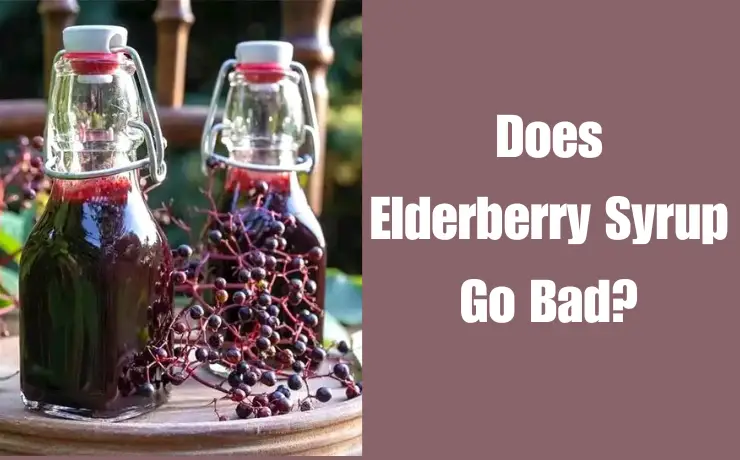As fall sets in and many of us turn to elderberry syrup for its immune-boosting properties and delicious taste, the question on everyone’s mind is: Does Elderberry Syrup Go Bad?
How long can you keep that bottle in the pantry, and when does it expire? Let’s dive in and answer all these important questions!
👉🏻 Check out the cheapest and highest quality Elderberry Syrups!
Also, check out does pumpkin syrup expire, does glucose syrup expire, and does Torani syrup go bad.
Does Elderberry Syrup Go Bad?
Yes, elderberry syrup can go bad, and it’s important to store it correctly to maximize its shelf life. Typically, signs that elderberry syrup has gone bad include the presence of mold, an off-odor, or changes in texture like clumping or separation.
These indicators can be especially noticeable if you’ve opted for a homemade or preservative-free version, which may not last as long as commercial brands that include preservatives.
Factors affecting the shelf life of elderberry syrup include the quality of ingredients used, the inclusion of preservatives, and storage conditions like temperature and exposure to light.
Even if your syrup is within its expiration date, improper storage, such as leaving the bottle open or keeping it in a warm environment, can accelerate spoilage. So, always check your elderberry syrup before use, regardless of how long you’ve had it.

Symptoms of Bad Elderberry Syrup
So you’ve had a bottle of elderberry syrup tucked away and you’re wondering if it’s still good to use? Knowing the signs of spoilage can help you make that judgment call. Here are some symptoms that may indicate your elderberry syrup has gone bad:
Unusual Odor
Fresh elderberry syrup has a pleasantly sweet and tangy aroma. If your syrup starts to smell sour, musty, or just plain off, it’s likely past its prime.
Visible Mold
Mold is a definitive sign that your elderberry syrup is spoiled. If you see any fuzzy spots, discolored areas, or anything that doesn’t look like it belongs, dispose of the syrup immediately.
Changes in Texture
If the syrup has become excessively thick, has separated, or shows any form of crystallization, these can be signs that it has spoiled.
Altered Taste
While it may be harder to judge, an unusual or off-putting taste is a clear indicator that your elderberry syrup is no longer good to consume. Always trust your taste buds; if it doesn’t taste right, it’s best to err on the side of caution and discard it.
Discoloration
Fresh elderberry syrup typically has a deep, rich color. If you notice any fading or darkening, this could be a sign that it’s deteriorated.
Leaking or Bulging Bottle
If the bottle is leaking, has become distorted, or the lid is bulging, it could indicate that bacteria have been at work inside the container. In such cases, it’s better to dispose of the entire bottle.
Understanding these symptoms can help you ensure that you’re consuming elderberry syrup that’s not only delicious but also beneficial for your health. Always be cautious, and when in doubt, it’s safer to discard the syrup and get a fresh bottle.
👉🏻 Replenish spoiled Elderberry Syrup immediately.
Does Elderberry Syrup Expire?
Yes, Elderberry syrup expires, and like most food-based products, it comes with a “best before” or “use by” date that you should take seriously. This date is the manufacturer’s way of telling you how long the product will retain its intended flavor, potency, and overall quality.
Ignoring this date might mean that you’re not getting the full health benefits of elderberry syrup, or worse, that you’re consuming a product that has started to spoil.
Once you open a bottle of elderberry syrup, the clock starts ticking a bit faster when it comes to its lifespan. The exposure to air and potential for contamination means that you’ll need to consume it more quickly than an unopened bottle.
It’s advisable to store opened elderberry syrup in the fridge to prolong its shelf life, usually up to a couple of months depending on the brand and formulation.
On the other hand, an unopened bottle of elderberry syrup can last quite a long time if stored in proper conditions, such as in a cool and dark place. However, even if unopened, you should never consume the product past its expiration date.
Many commercially produced elderberry syrups contain preservatives that extend their shelf life, but if you’re using a natural or organic variety without preservatives, be extra cautious with the expiration date.
Regardless of whether your elderberry syrup is opened or unopened, always check for signs of spoilage like an off smell, mold, or changes in texture before consumption. These signs are especially important to look for if the bottle has been stored improperly or if you can’t remember when you bought it. When it comes to your health, it’s always better to be safe than sorry.

How Long Does Elderberry Syrup Last?
To help you navigate the world of elderberry syrup storage, we’ve put together a handy table that breaks down its potential shelf life under different conditions. With this information, you can maximize the duration for which this beneficial syrup remains a flavorful and effective part of your health regimen.
| Condition | Shelf Life | Additional Notes |
|---|---|---|
| Unopened, Pantry | 12-18 months | Store in a cool, dark place |
| Opened, Pantry | 1-2 months | Not recommended; refrigerate for longevity |
| Opened, Refrigerated | 6-9 months | Always use a clean spoon |
| Homemade | 2-4 weeks | Refrigeration is mandatory |
Understanding the variables behind the shelf life of elderberry syrup is crucial for its optimal use. If you have an unopened bottle, you’ve got a good amount of time—up to 12-18 months—if you store it in a cool, dark place away from direct sunlight. The pantry can be a suitable place for this, but you might extend that lifespan by keeping it in the refrigerator even before opening.
Once you break the seal, it’s best to store the bottle in the refrigerator. Doing so can prolong its usability to up to 9 months, but always remember to use a clean spoon to avoid introducing contaminants into the bottle. The shelf life shortens significantly if you opt to store it in the pantry after opening; 1-2 months is the most you can expect under such conditions.
Homemade elderberry syrup presents its own set of challenges, primarily because it lacks the preservatives found in commercial products. The fridge is your best friend in this case, but even then, you’re looking at a shelf life of 2-4 weeks at best. Always remember, if you’re in doubt about the quality of your syrup, it’s best to rely on visual and olfactory indicators to detect spoilage.
By being aware of these storage guidelines and expiration timelines, you can make sure that your elderberry syrup remains both delicious and beneficial for the longest time possible.

How to Store Elderberry Syrup for Maximum Shelf Life
When it comes to prolonging the life of your elderberry syrup, how you store it can make a significant difference. Elderberry syrup is a powerhouse of antioxidants and immune-boosting compounds, so you’ll want to make the most of every drop. Here are some best practices to ensure that your syrup stays as fresh as possible for the longest time.
Keep it Cool and Dark
If your bottle of elderberry syrup is still unopened, find a cool, dark place to store it—your pantry could be an ideal location. Cooler temperatures slow down the degradation of the natural compounds in the syrup, helping it keep its potency for longer. That being said, even unopened bottles can benefit from refrigeration if you have space. The chilly environment can extend the syrup’s shelf life beyond the usual 12-18 months to possibly even longer.
Refrigerate After Opening
Once that seal is broken, it’s a whole new ballgame. At this point, the refrigerator is your best friend. A constant low temperature will slow down any bacterial growth and keep your syrup tasting fresh. Remember, an opened bottle stored in the fridge can last anywhere from 6 to 9 months.
The Spoon Matters
You may not think it’s a big deal, but using a clean spoon every time you serve yourself some elderberry syrup can be crucial. Introducing bacteria or other contaminants into the bottle can speed up the spoilage process and shorten its shelf life. So, before you dig in, make sure that spoon is as clean as can be.
Consider Smaller Bottles for Homemade Syrup
If you’re making homemade elderberry syrup, consider storing it in smaller bottles. This reduces the number of times each bottle is opened, thus limiting its exposure to air and possible contaminants. As homemade syrups typically lack commercial preservatives, their shelf life is much shorter—usually just 2 to 4 weeks in the fridge.
By following these storage guidelines, you can maximize the shelf life of your elderberry syrup, making it a lasting and effective addition to your wellness routine.
Elderberry Syrup Go Bad FAQ
In addition to questions such as Does Elderberry Syrup Go Bad and Does Elderberry Syrup Expire, Let’s take a look at some questions that may be useful to you.
Does elderberry syrup go bad?
Yes, elderberry syrup can go bad, especially if not stored correctly. Always check for signs of spoilage like unusual odor, mold, or changes in texture.
How long does unopened elderberry syrup last?
Unopened elderberry syrup can last between 12 to 18 months if stored in a cool, dark place like a pantry.
Do I need to refrigerate my elderberry syrup after opening?
Yes, it’s recommended to store opened elderberry syrup in the refrigerator to extend its shelf life.
How long does opened elderberry syrup last in the fridge?
Once opened and refrigerated, elderberry syrup can last between 6 to 9 months. Always use a clean spoon to avoid introducing bacteria.
Can I use elderberry syrup past its expiration date?
It’s not advised to use elderberry syrup past its expiration date, as it may not provide the full health benefits and could pose health risks.
What are the signs of bad elderberry syrup?
Signs include an unusual odor, visible mold, changes in texture, altered taste, discoloration, and a leaking or bulging bottle.
Can bad elderberry syrup make me sick?
Consuming spoiled elderberry syrup can potentially lead to food poisoning symptoms like nausea, vomiting, or diarrhea. When in doubt, it’s best to discard it.
Is it safe to use homemade elderberry syrup?
Homemade elderberry syrup is safe if made and stored properly. However, it has a much shorter shelf life usually 2 to 4 weeks, and must be refrigerated.
Can I freeze elderberry syrup to extend its shelf life?
Yes, you can freeze elderberry syrup in an airtight container for up to one year. Make sure to leave some space at the top of the container for expansion.
Can I store elderberry syrup at room temperature?
While unopened bottles can be stored at room temperature, once opened, it is advisable to refrigerate the syrup to maintain its quality and extend its shelf life.

